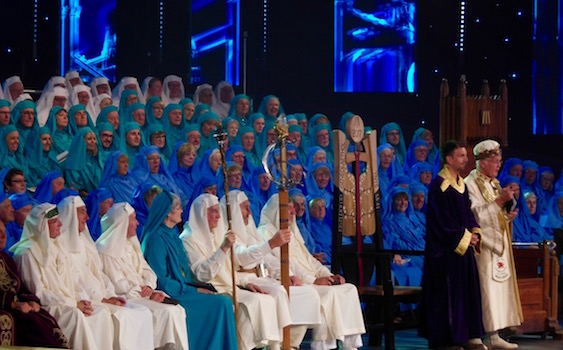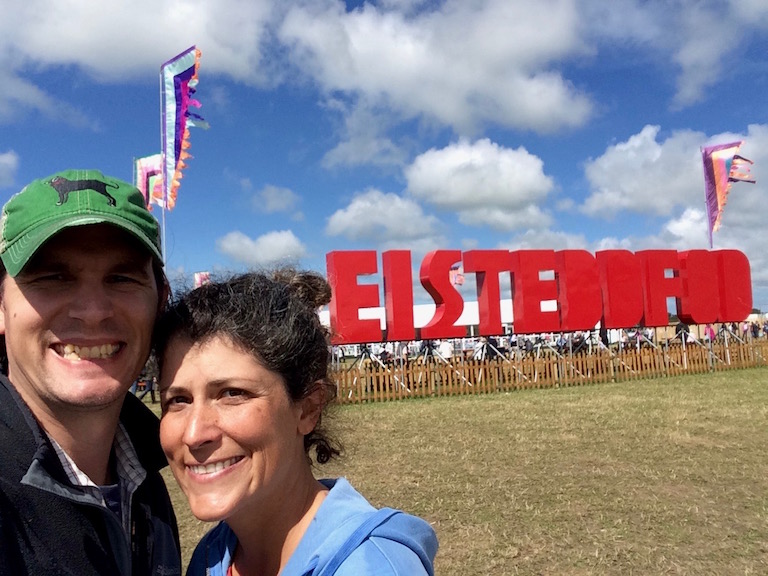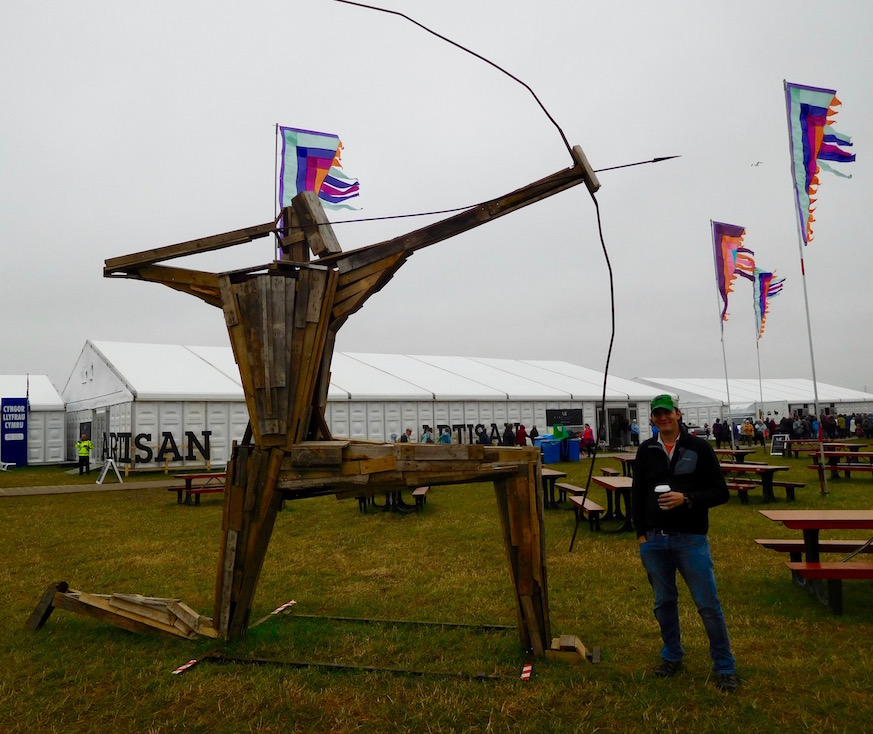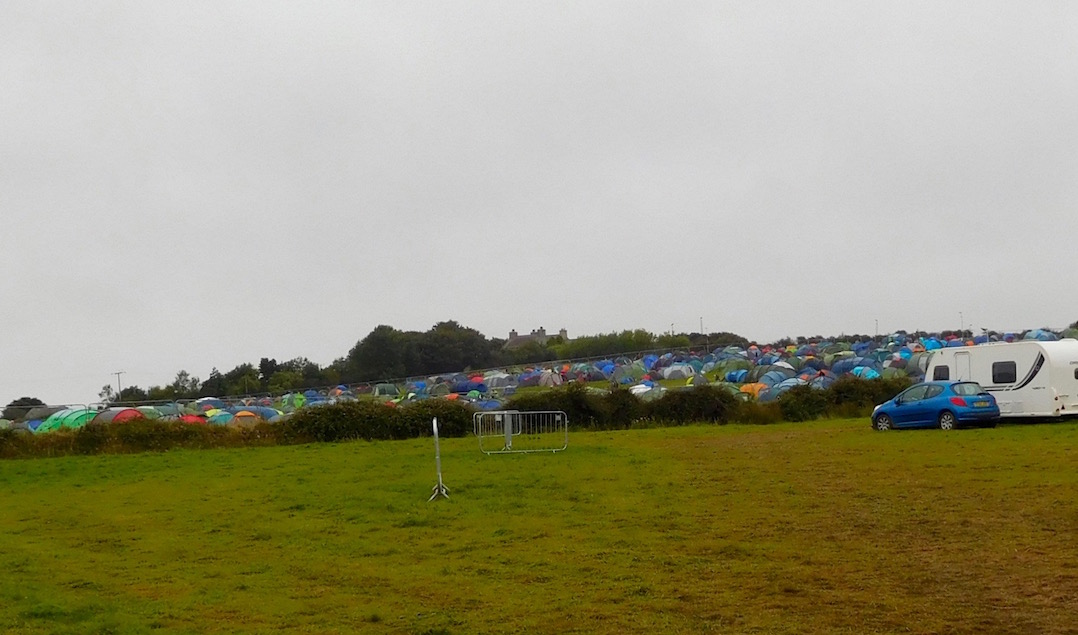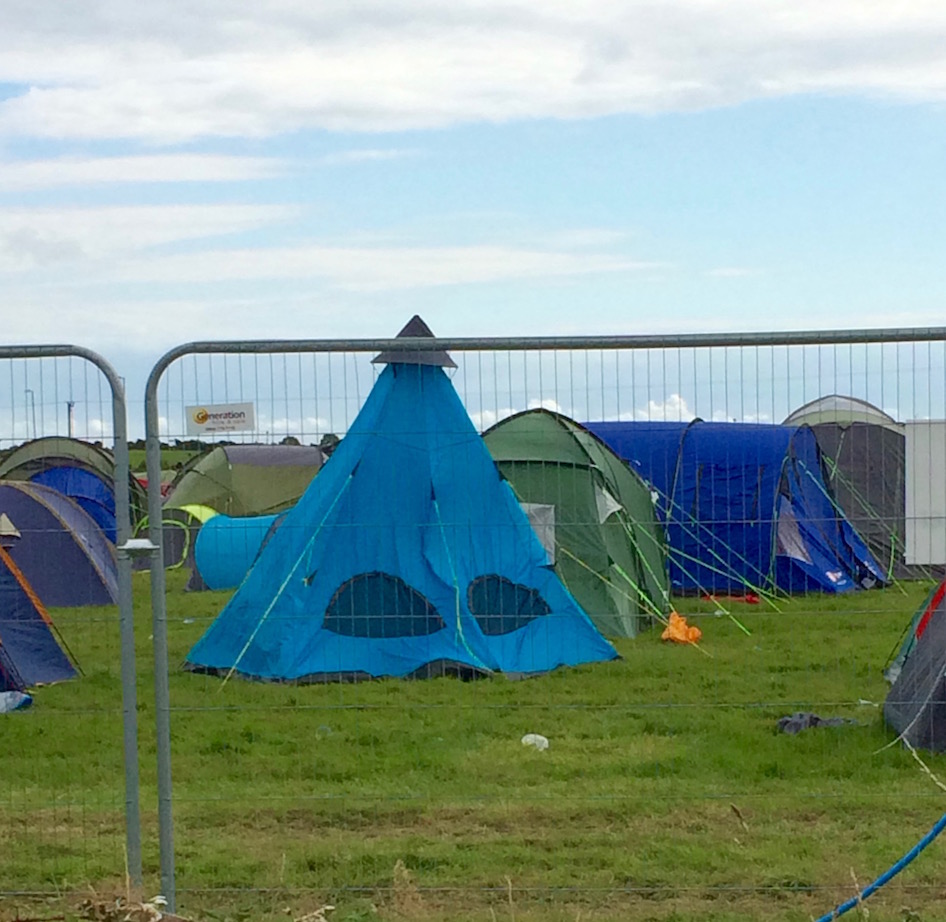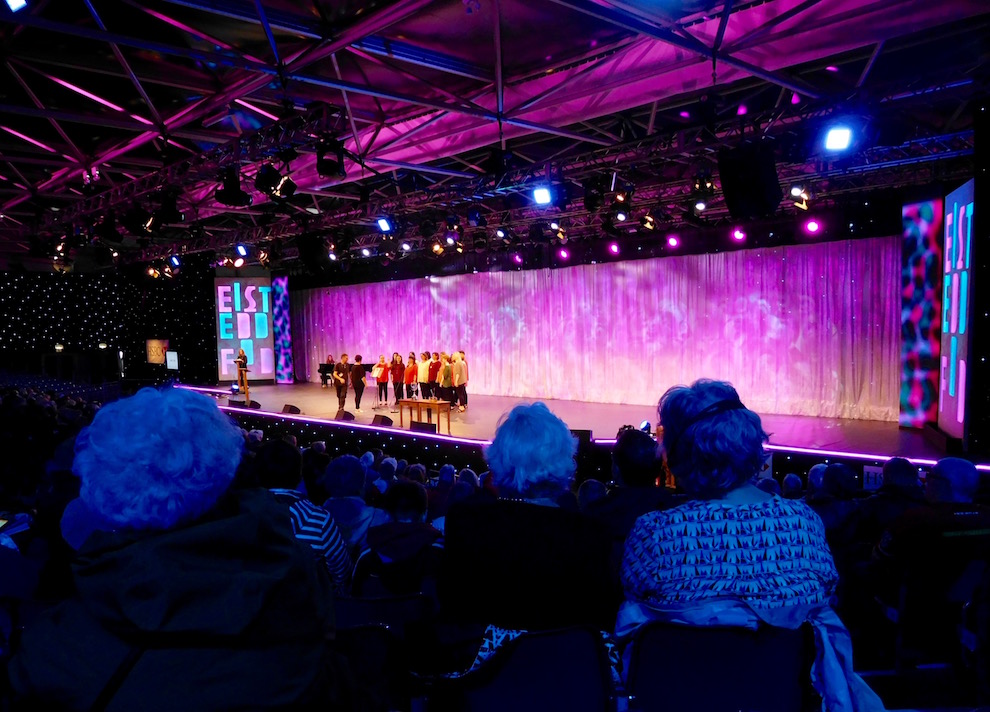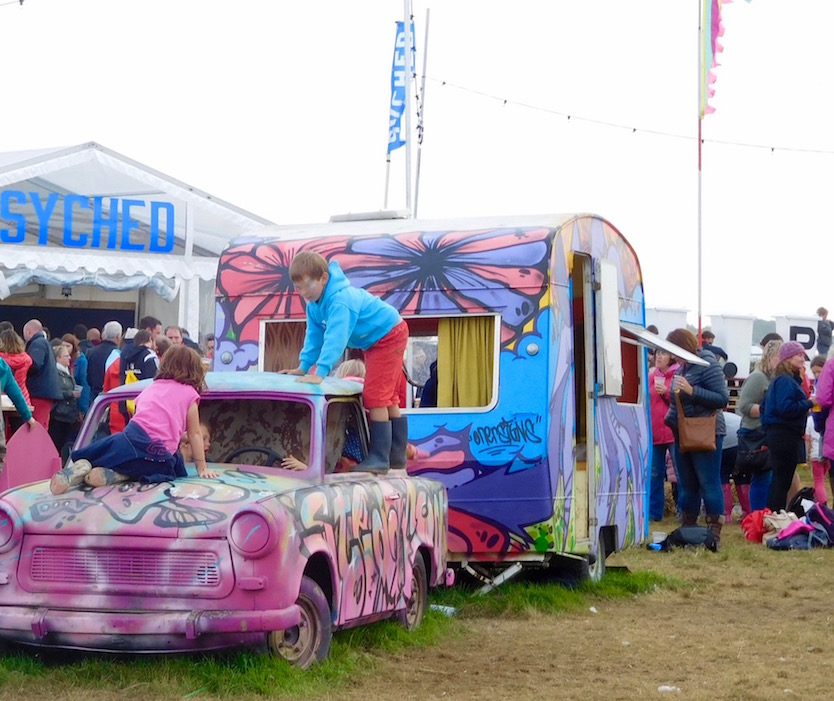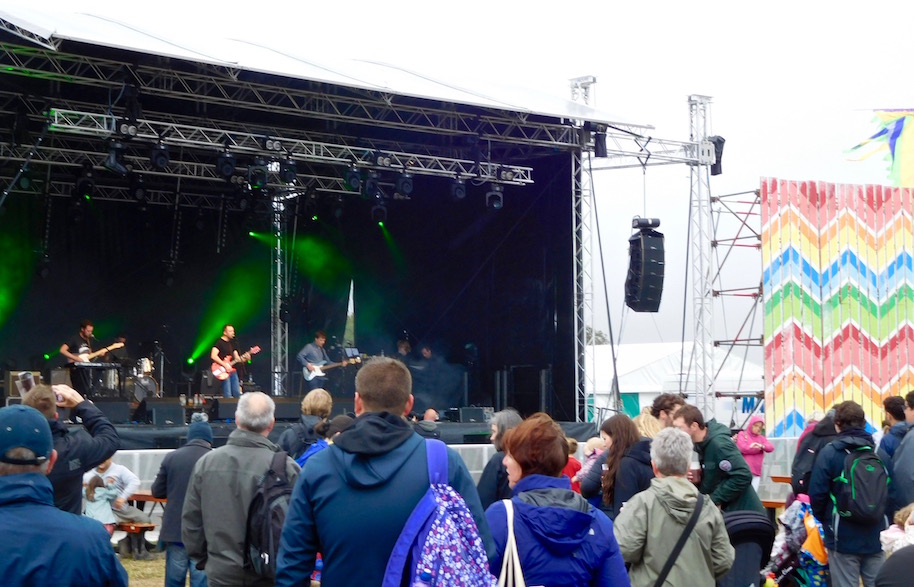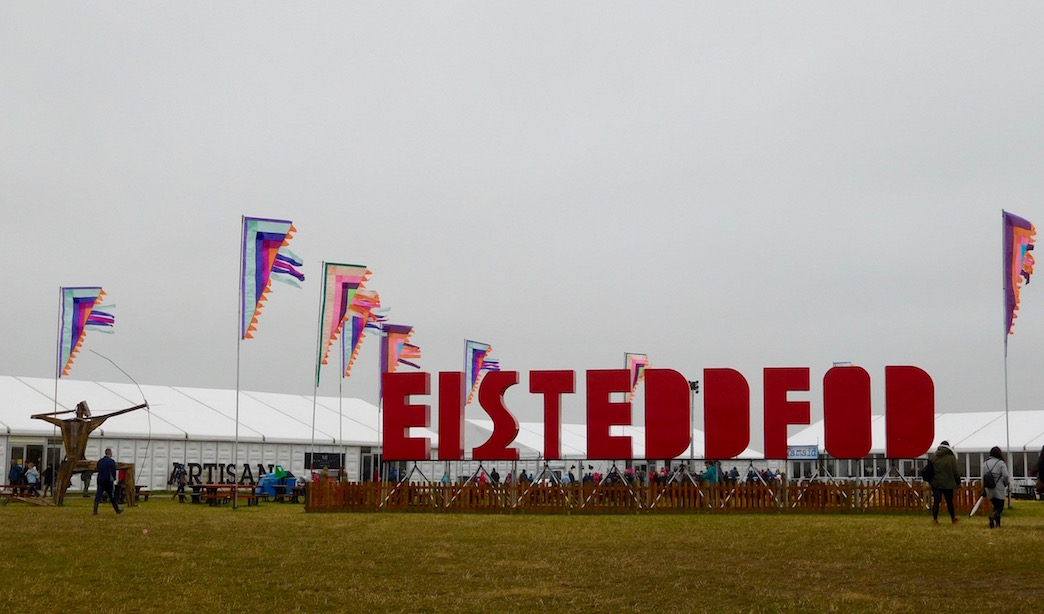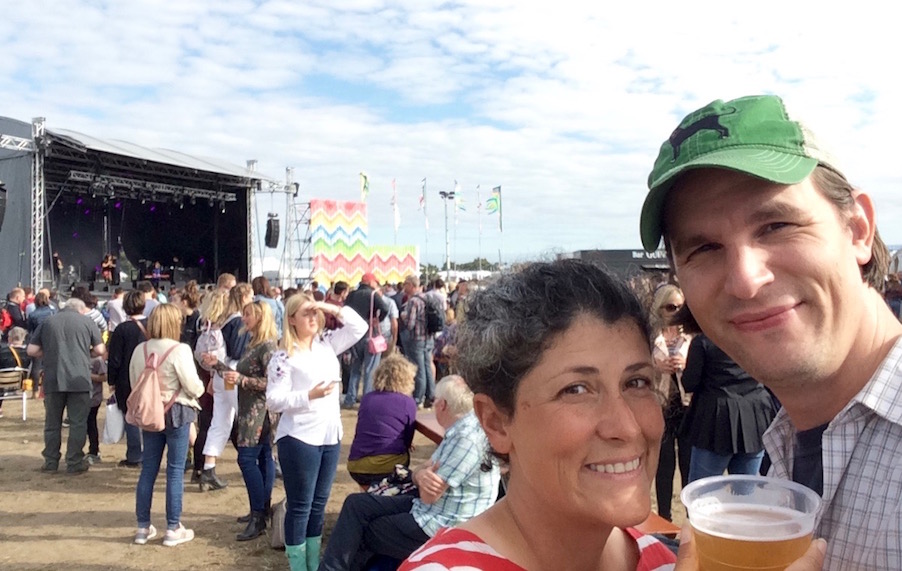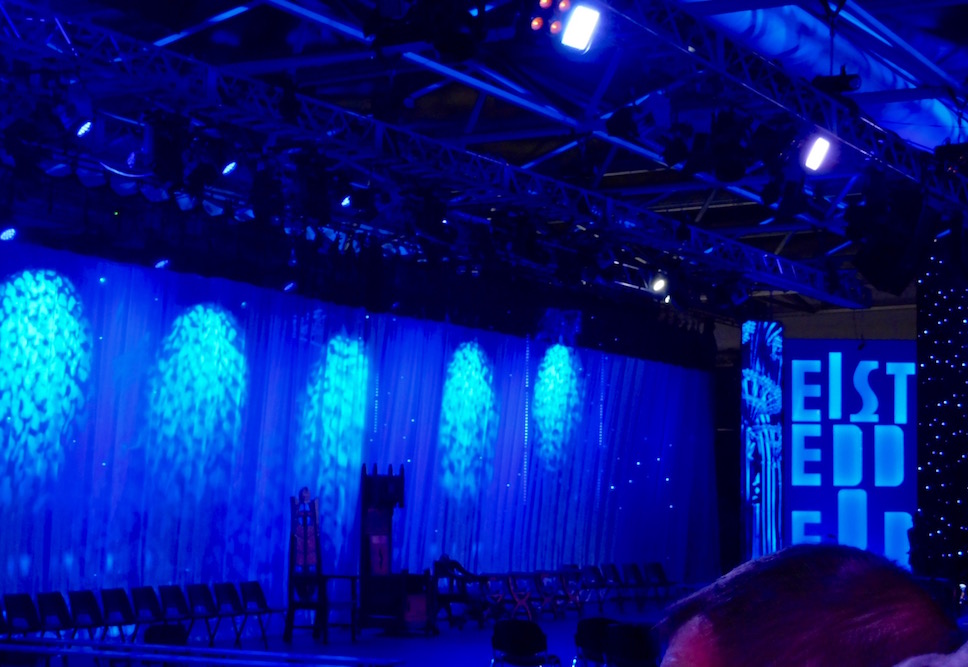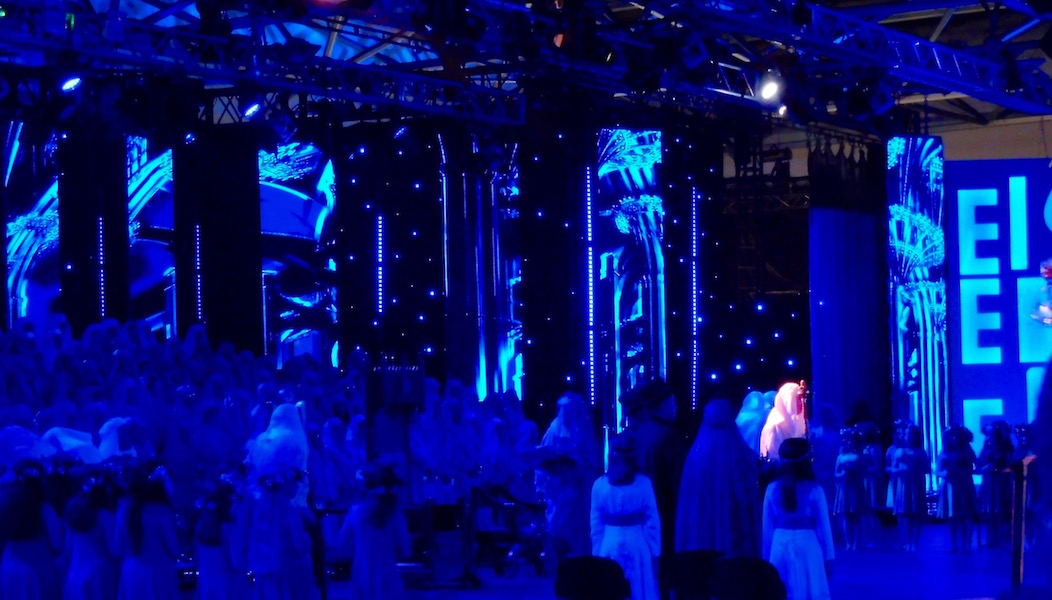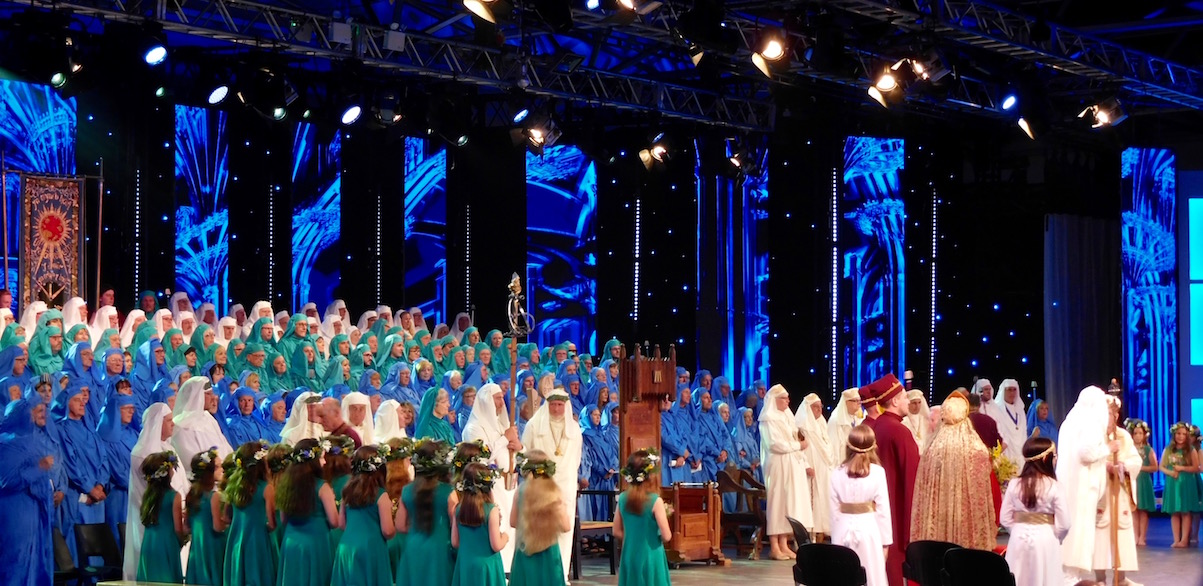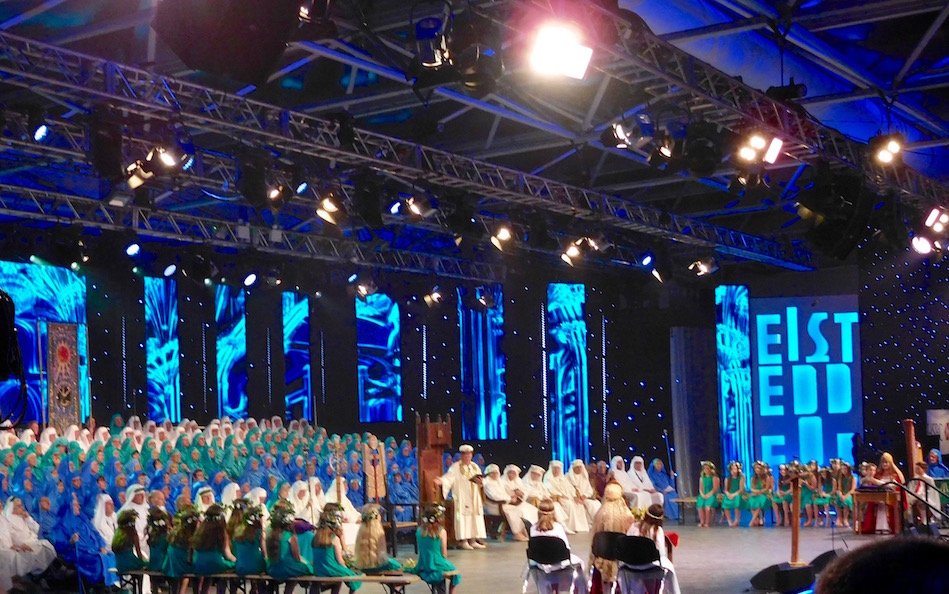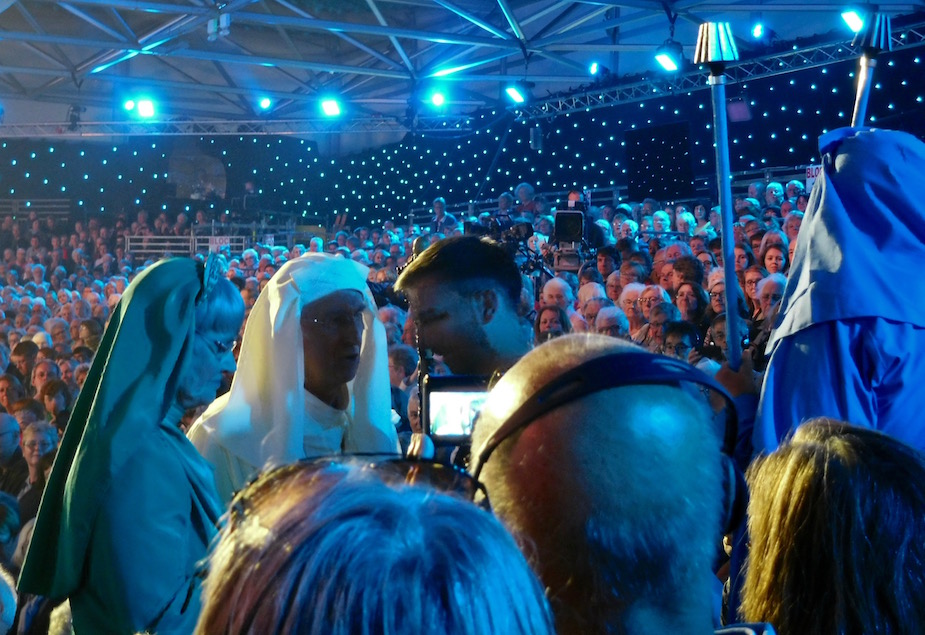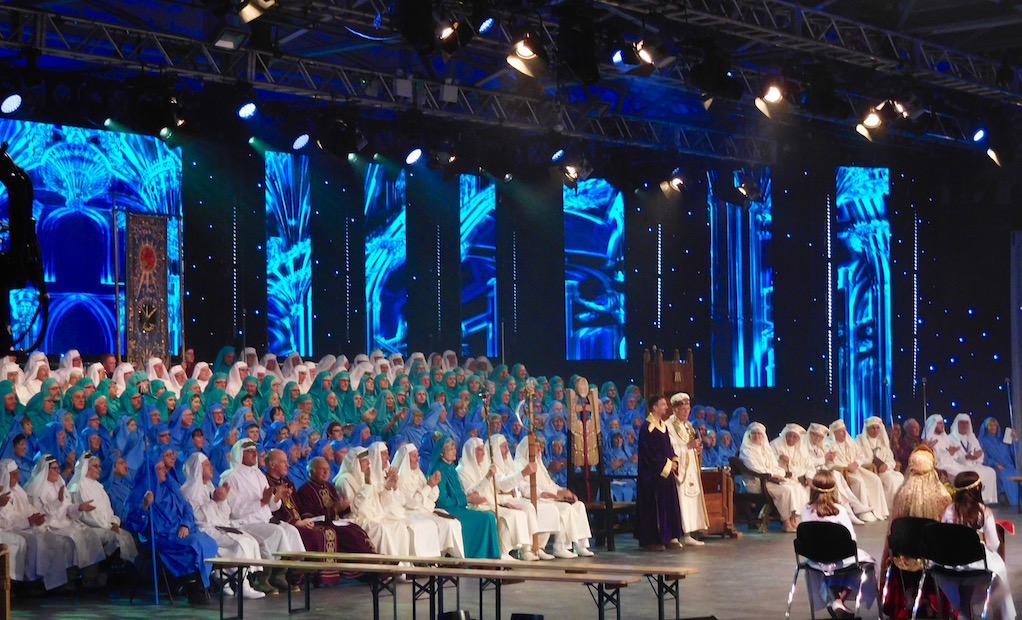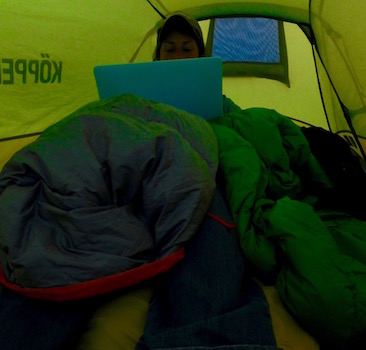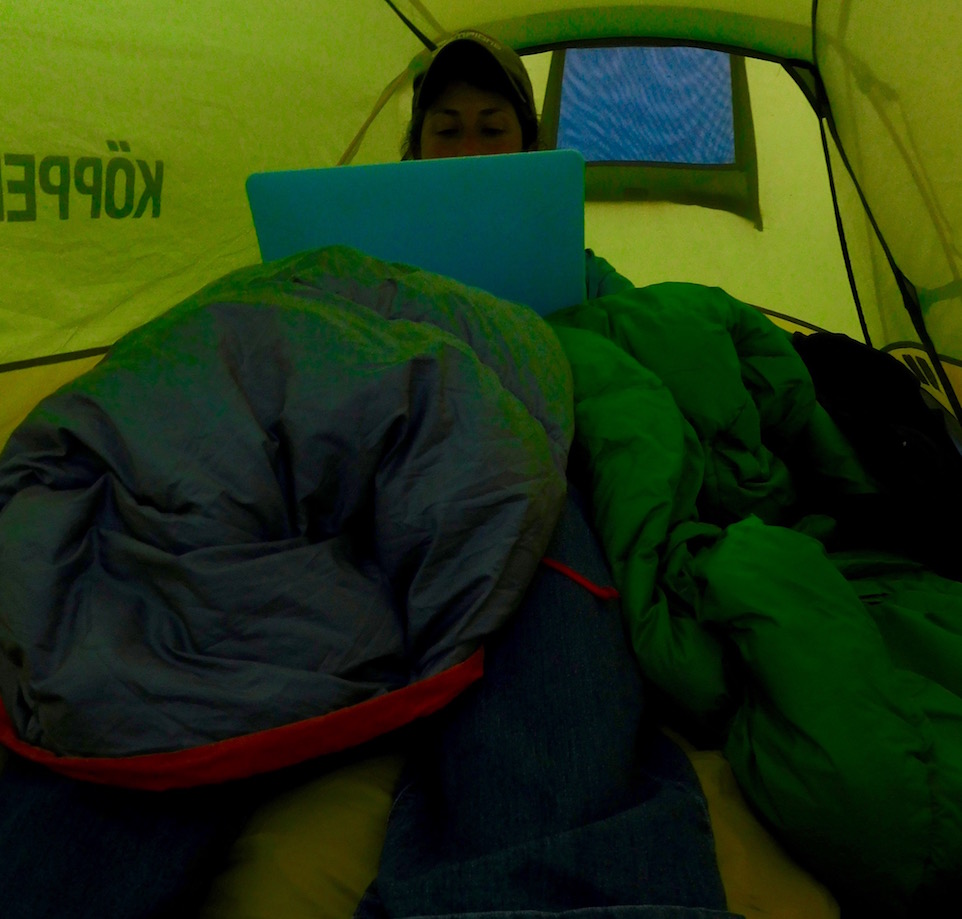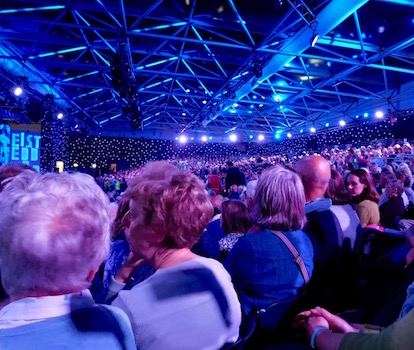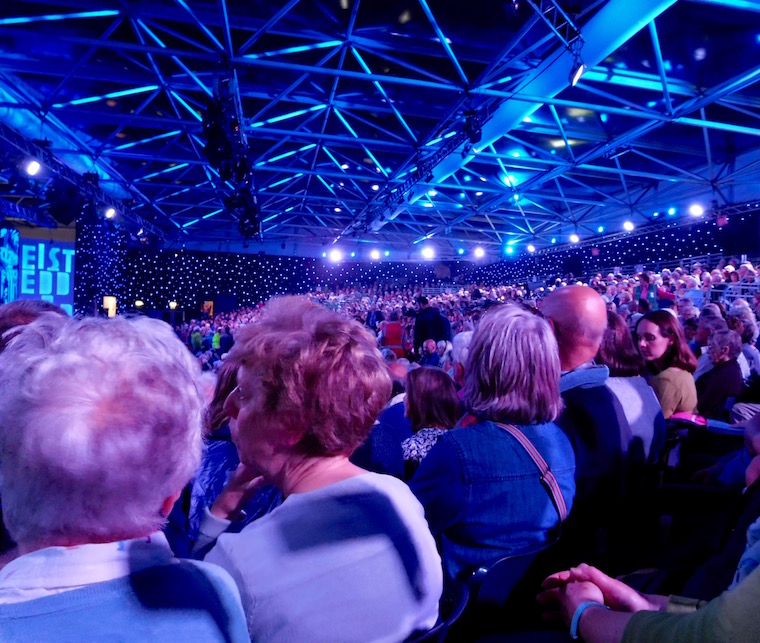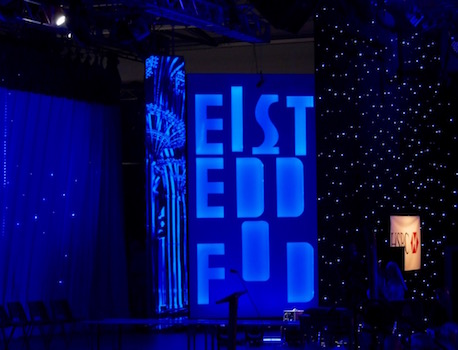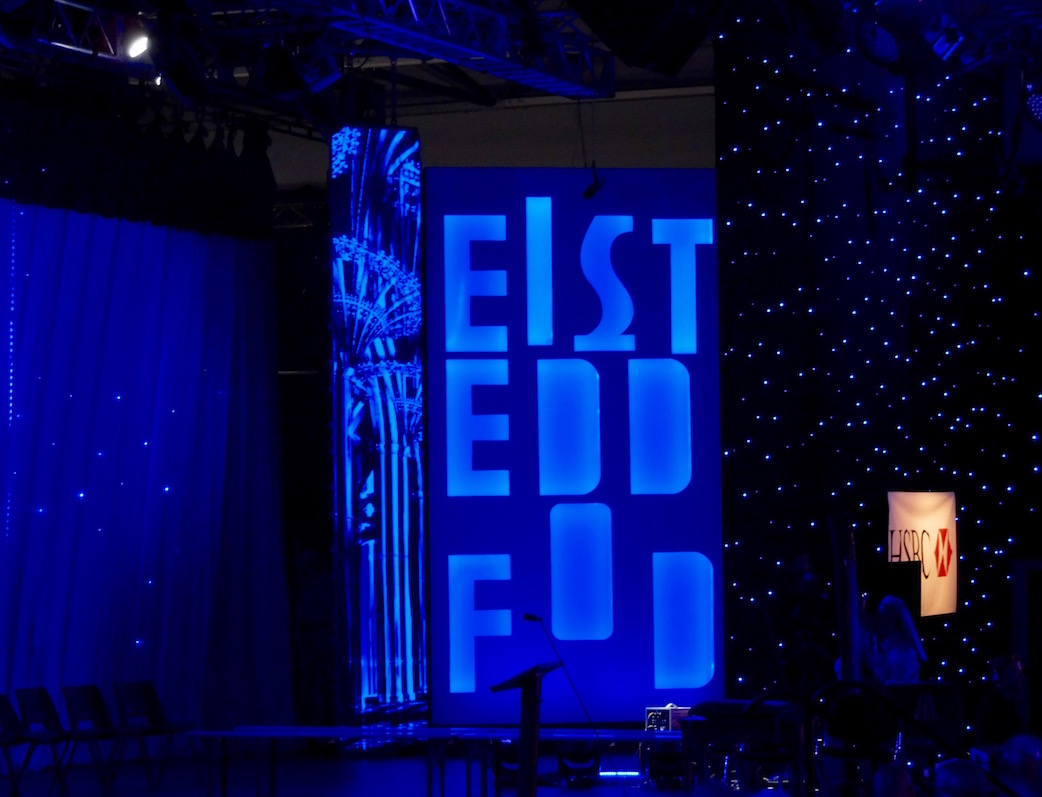First a Little Scene-Setting
Before I get into the nitty-gritty of our American journey into the depths of the Eisteddfod - first a little background. If you're reading this in the middle of my Wales border hike blog, you'll probably notice that Eisteddfod is in fact in August. Yes, correct. And it's clearly not August right now.
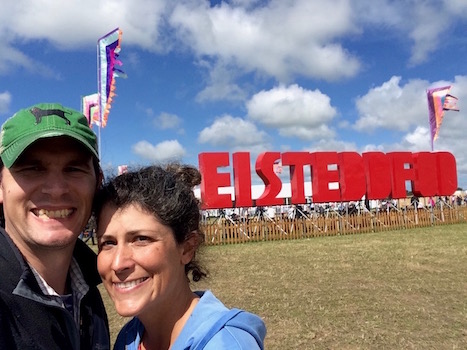
So, some background, when I was figuring out the basics of my walk around Wales, I was first scheduling around my friend MEl visiting in early July. As it turned out if I walked south from Aberdyfi, I could comfortably make it to Gower by the time she got here, so that ended up working out great. After that, I didn't have many milestones to make, but as I figured out where I would likely be, I thought I should be around Anglesey, generally, like, somewhere in North Wales anyway, by August. At that point I also learned that the National Eisteddfod (I'll explain a bit about that later for those who have absolutely no idea what I'm talking about) was being held in Anglesey around the time I'd be there.
This led me to two conclusions - first, that I probably should try to plan ahead in terms of accommodation for when I got to Anglesey and second, that it would probably be a great idea to actually attend the Eisteddfod, which seemed like a really interesting thing to see. So I set P on getting 'accommodation' in the form of four days at a tent site next to the Eisteddfod (which anyone else would have realized was actually a rather short amount of time for someone concerned with having no place to stay while hiking Anglesey - which takes at least ten days, but anyway) and he got us two tickets to the event itself.
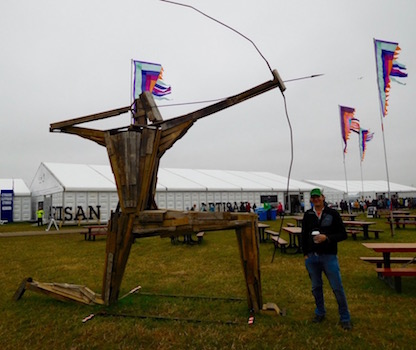
Anyway, to be totally clear about this, where I'm putting this description in my 'timeline of hiking days' isn't 100 per cent accurate - and like I said we spent four nights sleeping there and two days at the festival - but for the purposes of a blog post I appreciate your suspension of disbelief for a moment.
So What is an Eisteddfod?
Alright, so for those who have no idea why I'm attending something they can't pronounce (Aye-STETH-vod - at least I think), let me explain - the National Eisteddfod is basically a giant festival that's a celebration of the Welsh language and culture. To back up a bit even further, there are actually three different Eisteddfod's in Wales - the National Eisteddfod (this one), the International Eisteddfod (held in Llangollen every year as a world-wide folk music and poetry competition) and the Urdd Eisteddfod (a youth festival).
The first Eisteddfod (which just means 'a gathering') was actually held at Cardigan Castle in 1176, by Lord Rhys ap Gruffydd, with musicians and poets attending from all over Wales. At the time, poets were held in extremely high regard in Welsh society, and they would compete against each other for a seat at a nobleman's table. The modern version has since evolved from rules set out in a 1523 Eisteddfod in Caerwys, finally taking on its current form in 1861 in Aberdare. Around that time the National Eisteddfod Association was formed, which still carries out the planning for the event today. It's currently the largest competitive poetry and music festival in Europe, with up to 6,000 contestants and 180,000 visitors - and from what we heard others saying, this year's had the highest attendance in history.
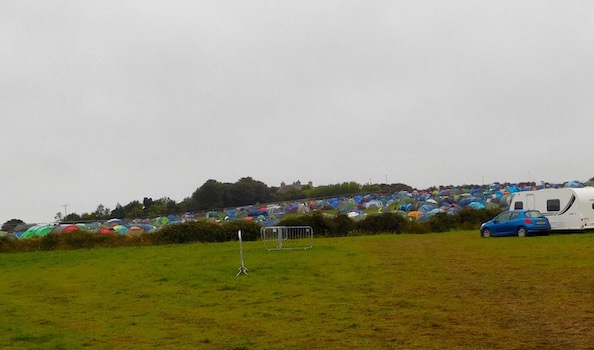
To be honest, P and I were attending the version of the Eisteddfod we probably had the least business being at (although we probably would have been more out of place at the youth one, come to think of it), given neither of us speak the remotest bit of Welsh. I'd wanted to start taking classes once we got here - but we moved to Wales right after most of the classes had started in September, and I'd figured I'd start up next year if we were staying. While I normally would try to pick up a language regardless, I found that because we live in an area with a large English retiree population, I rarely heard spoken Welsh in my day to day and basically all I could say by this point I'd learned from various bi-lingual street signs. Which I personally felt was kind of rude of me, especially given how much Welsh has died out (and in many cases been forced to die out thanks to years of literally beating it out of children at school). It seemed like the kind of language you should try to keep going just to make the cultural point, really.
But what better way to immerse yourself in a language than to go to the one place where literally everything is in that language and you thus have absolutely no idea what's going on? That's what we thought when attending what's effectively a giant Welsh poetry and music festival, and I have to say we learned more Welsh attending two days of Eisteddfod than we did in nearly a year in Wales.
And possibly more importantly, the Welsh are famous for being musical and lyrical - and if P's obsession with BBC Radio Cymru is any marker, you can appreciate good music without being able to understand the words in the slightest.
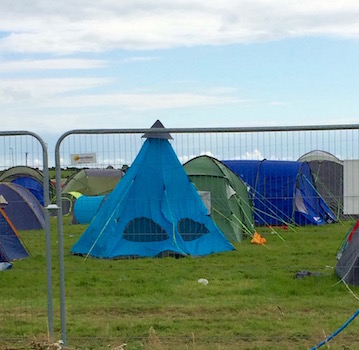
On to the Main Event
Unfortunately my camera at this point had almost ceased to function, and because we were staying in a tent without an electric hookup we had to conserve P's phone battery as well - so please excuse my lack of great photos and just use your imagination.
P had booked a campsite for the last 4 days of the Eisteddfod, which actually lasts much longer than that. When we arrived we were kindly told where to go in Welsh, and then, after we apologized and tried to look sufficiently ashamed of ourselves (not for the last time) that we had no idea what the person was saying and could they please explain that again in English, we made our way to our spot. That is to say, we drove along a tiny raised temporary duckboard type thing over extremely marshy ground through thousands and thousands of caravans, until we got to a tiny line of tents.
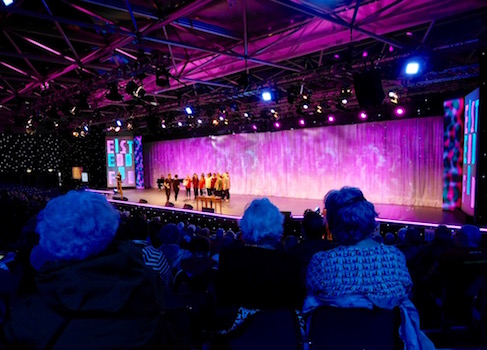
Because they seemed to fill up the fields of caravans by arrival time, we were at the very back of the fields, closest to what's called 'Maes B' (Field B, I think). Maes B is kind of the youth festival where parents drop their teenage-early twenties children off (or they attend themselves) to stay in their own much smaller I don't have a job yet tents and, from what we could tell, drink heavily, listen to louder and bigger-name music, and wait forlornly either outside or inside the fencing around the field (the former to see if they could find a way to sneak booze in, the latter to see if a parent with food might wander by and throw some over). Despite being close to what you might think would be the 'rowdy' crowd, P and I were continuously amazed by how well-behaved these kids seemed. I mean there were drunken antics but they seemed like totally non-aggressive drunken antics - the worst thing I saw was a kid trying to show off by doing a standing backflip just landing on his own back. He got back up, they all laughed and moved on.
Anyway, over in the 'adult' area, we clearly stood out not just because we were one of the few in a tent, but we were in the smallest tent possible. Smaller than even the starving students in Maes B. I have to say I never really understood the campsite-scene outside of the Quidditch World Cup until I came to Wales. As far as I can tell, British people basically just try to build houses out of canvas - there are multiple rooms, extra doors, and at times outbuildings for a variety of activities. I kept looking to see if someone had invented a two story tent. Meanwhile, in our own personal shanty-town, P and I barely fit into our two person lightweight tent, which fit into our luggage moving here so give us a break.
So after spending what was a series of exceedingly cold, windy and damp mornings in sleeping bags (even for Wales, this weather was abnormally cold for August, we were told), we would unzip the front tent flap and basically flop on hands and knees out of our tiny little tent in our pajamas sans shoes, while everyone else wandered comfortably in and out of their ginormous camping houses in the wellington boots they'd of course remembered to bring because they're not idiots. Lucky for us the bathroom facilities were, until the last night, kept spotless (especially considering the number of people and the amount of mud available), so I hope we managed to get ourselves looking remotely presentable before attending the festivities. (Although I did manage to seriously, seriously pull my back out when I stupidly read an article on P's phone that got me well and truly pissed off, and went to sit up quickly while yelling 'What the f***' and literally heard my back rip. But besides the extreme pain I was in for quite some time after that we were relatively well put together anyway.)
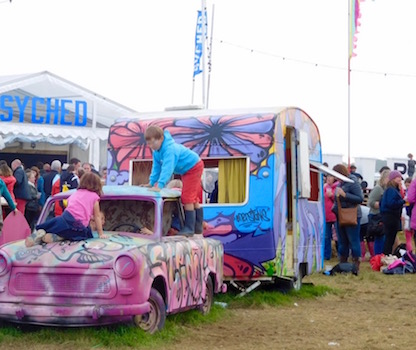
What's Going on Here?
Our motto of the day inside the Eisteddfod itself was 'What do you think is happening?' - and sometimes I think we got closer to the truth than others. Easy to figure out were the stalls - although there were hundreds of them, and mostly everything was described in Welsh, you could see what was for sale and figure it out. I personally really, really wanted the 'No, I'm from Wales and I speak Welsh' shirt that was written in Italian, but I thought that would probably just confuse too many Italians and lead any Welsh-Italian speakers I might run into to try to speak Welsh to me, which wouldn't end well.
Harder to figure out, of course, were some of the events we attended. The first thing we saw was easy enough - as it thankfully had a simultaneous translation. Otherwise we really wouldn't have gotten the gist of the 'Two Decades of Devolution in Wales' panel, pretty much at all. As it was I was slightly distracted by a little girl who's father thought it was totally cool for his very small daughter to keep trying to open an umbrella on my head, but I still managed to learn how close the devolution vote was in the 90s that even gave Wales back a Parliament. And also what a precarious position they seem to be in given the return of powers to the UK from Brexit - I'm not sure how devolved powers are defined in Wales, but there's currently quite the tug of war between those who believe leaving the EU means those powers are immediately given to the government of Wales, and those who believe they should be 'restored' to Parliament, and eventually over time devolved as appropriate. One of many not easy questions to answer, made all the more difficult for me to think about by the tiny little girl throwing various toys at me throughout the discussion.
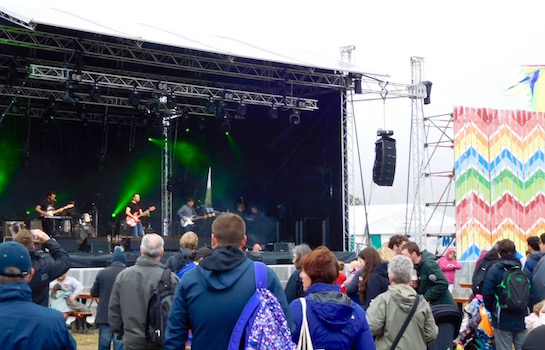
But easy enough to comprehend in English, really, unlike the televised poetry competition we attended a bit later in the day. Seated among an audience of a few hundred people, we basically just spent our time mimicking the reactions of other people around us to what was happening on stage. Oh, everyone's laughing? Quiet internal laughing smiley face for an appropriate length of time. Oh, everyone's getting a clever turn of phrase? Nod knowingly, with quiet internal smiley face that really covers all manner of possible activity that might be happening.
Unfortunately, partway through the action (which by the way even for not speaking Welsh really gave a sense of beautiful-sounding incredibly paced poetry) they started asking for suggestions from the audience for something, and I started getting terrified that I was going to get called on. Clearly PTSD from the Socratic method heavy days of law school, I anxiously started slumping down in my chair to make sure no one could see me, and irrationally whispered to P that if anyone called on me he was absolutely responsible for answering and we would pretend we thought they were talking to him.
I thankfully never got called on, and after they declared a winner we decided to go listen to some music in the largest venue at the festival - the Pavilion, where we had a wonderful time listening to the pride and joy of Wales - voice choirs. Again, not knowing the language only really slightly affected our enjoyment of the music. The singing is really incredible, and at times incredibly powerful. Unfortunately (I think) the Pavilion is the place just for the final competitions - so there were only a few choirs to hear as the others were weeded out earlier. But it was absolutely fabulous to listen to those we were there for.
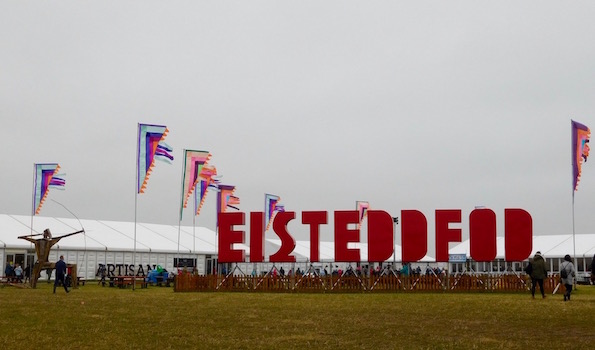
In our two days of festival-going, we also meandered around trying to watch some of the smaller competitions, as well as just observing what the hell was happening while eating and drinking at the outdoor stage. Unfortunately we went to a small ballad competition that only had one entrant. Although he was great - the best thing about it was that while sitting in the yurt (yes yurt) it was held in, we overheard the woman running it explain in English to the couple sitting behind us that unfortunately several contestants hadn't showed up so, etc. etc. The best part wasn't her explanation, but that further in the conversation with these two people who had an accent I couldn't quite place, she said something along the lines of 'Yes, there's great attendance this year, the highest in history. I know it's probably hard for people not from here to understand, but Wales is such a small place, and promoting our culture and language is so important.' To which the couple laughed a little and responded 'Well, we're from Luxembourg, actually, so I think we get it.' I just thought that was hysterical.
Anyway, we also thought some of the acts on the outdoor stage were. . . interesting. They were actually great, but occasionally you get a super-hipster girl band wearing fluorescent spandex tights and they put on giant sombreros and start playing California surfing music and as a North American you start wondering what's going on. Also there were the people in the animal hats, the metal band and any number of other really great musicians that really made me wish I spoke Welsh because the music on its own was pretty good.
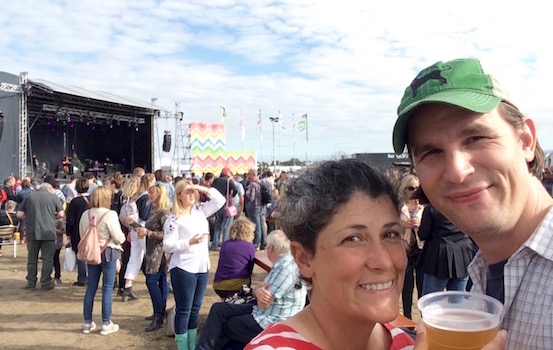
But really, the biggest head scratcher was yet to come.
The Chairing of the Bard
So, at some point we casually headed off to get in line outside the Pavilion to see the Chairing of the Bard. We realized when we were actually cut in line by several hundred normally peaceful Welsh-people that we were headed into a Big Deal. Now, we'd kind of realized that the chair presentation was a 'thing' before that point, which is why we wanted to see it. I'd seen versions of the carved historic chairs in various historic sites like castles and also at the National Library in Aberystwyth. From what I understood, it was the highlight of the Eisteddfod to give the chair to the winning Bard in a competition involving a very strict type of Welsh-specific poetry. This poetry has very specific rules, involving alliteration (including internal alliteration and rhyme) that are unique, and during certain years the judges determine that no one has met the appropriate standard, and so no one wins.
What we didn't realize, was exactly what the ceremony was like.
Now, I hope I'm not going to offend any Welsh people who might be reading this - but I absolutely have to describe this in the way we went through it (later I'll take a stab at actually explaining), because as an outsider not knowing what to expect. . . Well, let's say it was surprising.
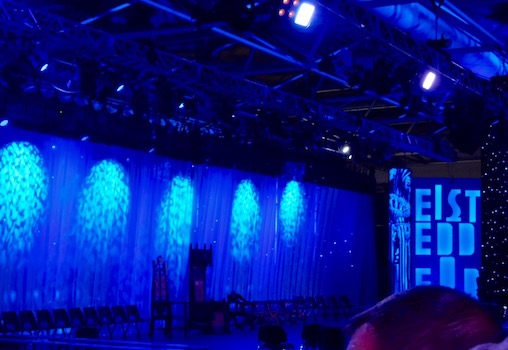
So, after getting pushed out of line by half of Welsh-humanity the doors shut and they started letting people in only by twos and threes. Eventually P and I got in and squeezed ourselves into a row to the far left of the stage but relatively close, so we had a good view. It was dark, with blue lights, and it seemed like people were walking in behind the stage but it was hard to tell, and really what you could see was the dimly lit giant thrones on the stage, in the middle of a line of regular chairs.
Eventually the curtain raised, and yes, there were clearly at least a hundred people lined up back there but really it was still too dark to see them. Then a procession of some sort started to the front row, but really all you could make out was the one guy in the spotlight, who was. . . Wait, is that guy in like white robes and a giant hat with a huge gold chain around his neck? And is he carrying a staff? Ummm, ok, seriously, what's happening here?
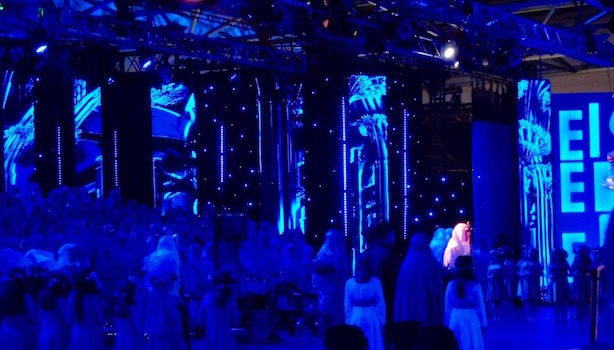
After the chanting began, I started to get that weird tingly feeling that is the hallmark of your body being unfamiliar and wanting to run, but with my mind laughing hysterically at that reaction because this is literally the award ceremony for a poetry contest so why would I be trying to run away? Am I scared of rhyming?
Well, here's the thing. I've travelled a lot, all over the world. I've seen a lot of things that aren't in keeping with my own culture, and totally appreciated them and thought they were great. And I don't know whether it was my complete lack of knowledge of what was happening or if I was tired or if I had just recently seen that Sherlock Holmes movie where he discovers the underground cult, but when the lights went on and everyone was chanting and singing and dressed up in brightly colored robes with matching headdresses and there was a woman playing a giant harp and another woman guarding what looked to me like the Horn of Winter (P keeps telling me not to call it that, but it will forever be the Horn of Winter on a gilded cushion to me) and small children in shifts wearing no shoes and a guy with a ginormous golden sword backed by a giant golden tapestry with a sun symbol woven onto it, well, my eyes got kind of wide and in my head unbidden came the words 'What the f*** is this' and out of my mouth came a whisper in P's ear 'Oh my god, I think they're going to sacrifice a virgin, protect m. . . that kid over there or something' and for which he pushed me away trying not to laugh too loud.
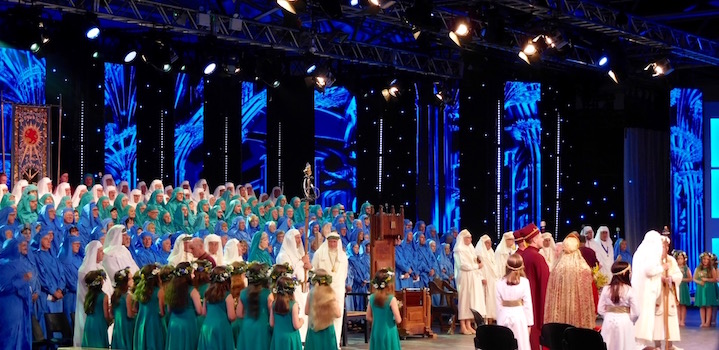
I really want to stress here that I'm not trying to make fun of this ceremony, which I actually thought was pretty freaking awesome. But the reason it was awesome is that for me, anyway, it was entirely unexpected and pretty cool and I had no cultural reference whatsoever and for that reason it kind of left a strong impression on me - and at the moment itself it was honestly a sort of fight or flight impression, which was entirely out of whack with the reality of the fact that this was being shown live on BBC Wales. Although I've since imagined how funny it would have been to have had the crazy American lady go running screaming out the door in the middle of the ceremony, I sat quite still and was enthralled by the whole thing, wishing I'd figured out where to pick up the translation headphones. But then also happy I hadn't because when in today's over globalized world are you well and truly surprised by anything?
So, in short succession what happened next (because this blog post is pretty ginormous already) - the head of the robed people stands up and makes a speech. He appears to read out a poem of some sort, and talk about it a bit. (In my imagination he may or may not be talking about appeasing the gods through human sacrifice, but my mind insists it's probably a poem). After some more of this, he says a name several times, and a guy sitting right across the aisle from us stands up. There are whispers of 'He's so young' around us. The head robed guy comes over with some other people carrying staffs topped with flat-topped pyramids and congratulate this person in the audience, eventually putting a purple robe on him. He's led to the stage where more comments are made about how young he is, and we distinctly catch the words 'Maes B' as the head guy makes some Welsh jokes (P suggested this might be the Johnny Carson of Wales). At a certain point in these proceedings, the young girls in shifts do what looks like a midsummer pole dance. At another point the giant harp is played. The Bard is also offered the curved Horn of Winter I've been staring at for the longest time, by a woman in a medieval dress. And at yet another point, the giant sword one guy is holding is held out over the winning bard's head and semi-unsheathed a few times.
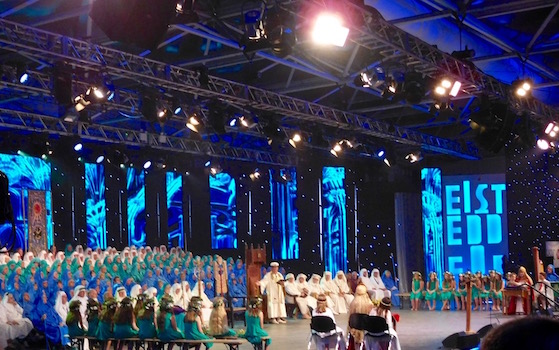
He gets his giant throne and everyone applauds and great merriment is apparently made by all, and everyone in the audience proudly sings some song together that comes out sounding like they rehearsed it for months beforehand, because this is Wales and I'm the only person here who can't sing like a professional (but I'm great at making up words to mouth while the camera's pointed at me).
Meanwhile, back in my nervous system, it's become apparent that everyone is cool with this and no one's been sacrificed and my adrenaline catches up with what my head has trying to tell it - that everything's fine. And oh how I wish that my camera wasn't broken.
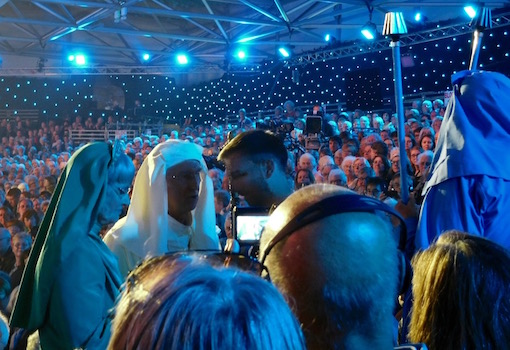
When the lights come up, P and I look at each other and silently make a wide-eyed 'Oh my god what was that?' signal to each other that means let's wait until we're out of the hearing of all these perfectly nice people so we don't act like totally rude jerks in front of them. And then we get outside and each are like 'So, I think that's something we really need to look up online then?' 'Yes?' 'What WAS that?' 'Did you see the Horn of Winter?' 'It wasn't a Horn of Winter.' 'They're going to bring down the Wall!' 'Oh my god, shut up, let's get a drink and some paella.' Because there was paella.
Anyway, in the world of things we probably should have looked up beforehand - this was a re-reconstructed Druid ceremony, based on a ceremony originally performed in 1176. Real druids used to be a real part of Wales (well pre-dating the 1176 ceremony), until they were cornered on Anglesey by the Romans and eventually smashed in the first century in order to get to the copper. There are now Druid societies, and in this particular ceremony the people in the sea-foam colored druid robes who were behind the activity are each people of significant achievement in Welsh society, and the color of the robes indicates what field. So basically the people my body was telling me were going to make a human sacrifice were actually like the Nobel Laureates of Wales. Which made me feel a tiny bit guilty but really more amused at myself in general.
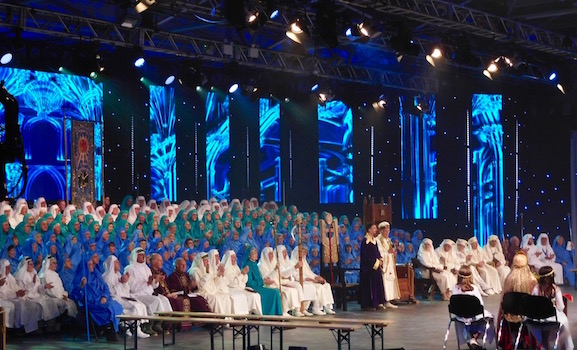
Other points of interest - the Bards who enter the competition do it under a Bardic name - no one judging knows the real name of the Bard while they're reading the poems. The head Druid discusses the poem at the beginning of the ceremony, reads the poem itself, and calls for the winning poet three times by his Bardic name between trumpet blasts. When he stands up in the crowd it's the first time anyone realizes who the Bard is (during WWI no one stood up, and it turned out the Bard had been killed in the war six weeks prior). In this case he was, clearly, notably much younger than previous Bards. They crown him, bring him to the stage, and three times partly unsheath a giant ceremonial sword over his head asking if there is peace. He's also presented the Horn of Plenty and told to drink by a married woman, and little girls welcome him with a ceremonial dance.
If I haven't made it clear before, the Chairing of the Bard was one of my favorite things about Eisteddfod, which is now one of my favorite festivals in Europe. You might wonder why, since I literally had no idea what was going on and spent half my time in (totally irrational) terror. But there are a million festivals in Europe that no longer actually maintain their own meaning. They're overrun with (often drunk) tourists, who are there for a spectacle rather than to actually celebrate what's being celebrated. It totally ruins the fact of the actual festival. (I know that that might seem hypocritical to say since we were the tourists here, but we really, really tried to just be unobtrusive people quietly celebrating things we didn't totally understand) Eisteddfod, however, was really entirely for Welsh people, to celebrate Welsh-ness. We were always made to feel welcome (in particular when we visited the 'Wales in America' tent, and learned that P's mid-western favorite sausage-maker, Bob Evans, was Welsh), but the festival wasn't about making money or bringing in tourist dollars. It was about bringing together a dwindling minority community and its traditions.
It was really, really great - and maybe eventually I'll even understand what happened.

